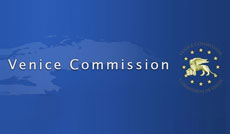
Venice Commission calls on Georgia to reconsider Reform for elections, political associations, and parliament rules
By Khatia Bzhalava
Thursday, March 25
Per the request of the Chairperson of the Parliament of Georgia Irakli Kobahidze, the Venice Commission and OSCE/IDIHR have issued a joint opinion on recent amendments in Georgia to the Election Code, the Law on Political Associations of Citizens, and the Rules of Procedure of the Parliament. The OSCE/ODIHR and the Venice Commission call on Georgia to reconsider a controversial legislative package.
The statement says that proposed changes in the Election Code “would infringe the rights of political parties to equal opportunities by denying them free airtime if they do not receive public funding.” The statement's authors believe that denial of free airtime to those parties is “disproportionate and unfounded”, as the parties with limited funds will need free airtime to voice their opinions and present their programs to the electorate. The authors further state that there is no evident connection between allocating free airtime and receiving state funding that would justify such a step. The statement also reads that such restriction does not reflect public interest as it would reduce access to information that the public needs to make an informed choice in elections.
The Venice Commission is also concerned by the proposed amendment to the Law on Political Associations of Citizens that would deny state funding to a political party or electoral bloc that did not take up at least half of the parliamentary mandates that it had won. According to the amendment, a political party or electoral bloc would be deprived of state funding for the next six months if half of the MPs of any party or bloc did not attend without good reason more than half of the plenary sessions.
“Sanctioning political parties – and not individual MPs – by depriving them of funding, if the respective MPs do not attend most sittings during a parliamentary session, appears “disproportionate” and at odds with the Parliament’s Rules of Procedure, which already regulate such matters in a clear and balanced manner,” said the Venice Commission.
Venice commission recommends considering “more proportionate and appropriate means” to achieve the goal of the amendment, which would involve imposing direct consequences on individual MPs for their actions. “This would be more in line with the Georgian Constitution and international standards,” reads the joint statement, adding that such broad sanctions against parties that do not participate in parliamentary activities do not exist in any of the Venice Commission and OSCE / ODIHR member states.
The Venice Commission did not welcome the amendment which allows deregistering a party-list if the party leader is a citizen of a foreign state. The statement reads that the amendment may restrict the rights of candidates and voters at the same time.
“While the right to vote and stand for election may be subject to some conditions, including the respective individual’s nationality, restrictions of aliens to participate in domestic political life should be limited to the establishment of political parties, but not to their membership,” said the Venice Commission.
According to the joint opinion, the bill lacks objective criteria that “would be used to determine who is considered to be an electoral list or party’s political leader.”
“To strengthen political pluralism and help to ensure the proper functioning of democratic institutions, the OSCE/ODIHR and the Venice Commission, therefore, make one main recommendation, which is to reconsider adopting the proposed amendments", - reads the joint opinion.
The legislative package was unveiled in December 2020, however, due to the controversy and criticism coming from the civil society, NGOs, and opposing politicians, following the endorsement in the first sitting, GD chair Irakli Kobakhidze announced that the hearings would be postponed until the Venice Commission and ODIHR opinion could be known.


